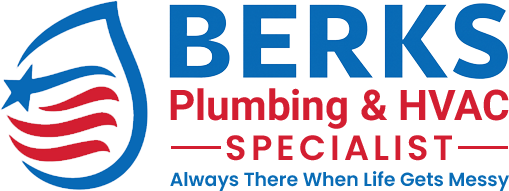When homeowners ask, “How long does an HVAC system last?” the answer isn’t always simple. A residential HVAC system’s lifespan depends on installation quality, usage habits, maintenance frequency, environmental conditions, and even the weather patterns in your region. Whether you live in Berks County (Fleetwood, Bethel, Reading, Exeter 19606, Wyomissing, West Lawn, Strausstown, Sinking Spring 19608, Mohnton, Temple, Auburn, New Ringgold), Lebanon County (Lebanon, Myerstown, Palmyra, Annville), West Chester County (Unionville, Wagontown, Downingtown, Coatesville, Exton), Montgomery County (Collegeville, Pottstown, Perkiomenville, Gilbertsville), Bucks County (Quakertown), or Lehigh County (Breinigsville, Macungie)-your climate and home conditions directly influence how long your HVAC lasts.
This comprehensive guide breaks down everything that affects HVAC system lifespan, how to spot aging signs, and practical ways to extend HVAC lifespan.
Understanding Typical HVAC Lifespan
Average Lifespan of Air Conditioners
Most central air conditioners last 12–17 years. In moderate climates, a well-maintained AC can reach 20 years, but in areas with hot, humid summers like Reading, Sinking Spring (19608), or Wyomissing, condensation and long cooling cycles can shorten AC life.
Factors That Shorten AC Life
- Long daily runtime in hot climates
- Oversized or undersized units
- Dirty filters causing poor airflow
- Poor refrigerant management
- Neglecting annual servicing
Example:
In Exeter (19606), homeowners often run AC units 6–8 months a year. An AC used this heavily without maintenance may only last 10–12 years, compared to the 17–20 years seen in lighter-use areas such as Bethel or Strausstown.
Average Lifespan of Furnaces
Gas furnaces typically last 15–20 years, while electric furnaces can reach 20–25 years.
Cold-weather counties such as Palmyra, Annville, and Pottstown experience extended heating seasons, which can reduce furnace longevity if filters are not replaced regularly.
Heat Pump Lifespan
Heat pumps generally last 10–15 years because they run year-round for both heating and cooling.
In high-humidity zones like Mohnton or Temple, outdoor coils corrode faster, reducing system life if inspections are skipped.


Major Factors Influencing HVAC Longevity
Quality of Installation
HVAC installation is the #1 factor that influences long-term system lifespan. A system installed incorrectly can lose 30% efficiency from day one and fail 5–7 years earlier.
Proper Sizing and Load Calculations
A professional should conduct a Manual J load calculation before installation.
Oversized Systems
- Short cycling
- Higher humidity indoors
- Increased wear on compressors
- Shortened lifespan by ~20–30%
Example:
A homeowner in Kutztown installed an oversized 4-ton AC in a small home. The system cycled every 6–8 minutes and lasted only 9 years instead of the expected 15–17.
Undersized Systems
- Constant runtime
- Higher electricity bills
- Premature motor and compressor failure
Maintenance Consistency
Regular maintenance is essential to extend HVAC lifespan.
Filter Replacement
Filters should be replaced every 30–90 days, depending on home conditions.
MERV Rating Considerations
- MERV 8–11 is ideal for most homes
- MERV 13+ offers better filtration but may restrict airflow on older systems
Effect on Airflow
Restricted airflow forces blowers to work harder, increasing:
- Heat exchanger wear
- Evaporator coil freeze-ups
- Energy consumption
System Usage Intensity
A system used 2,000+ hours/year wears out nearly twice as fast as one used 1,000 hours/year.
Homes in New Ringgold, Auburn, and Birdsboro with older insulation often see higher runtime hours, reducing system life.
Local Climate Conditions
Humidity, long summers, and freezing winters all influence lifespan.
Quality of Parts and Components
Cheap capacitors, low-grade coils, and poor insulation can shorten system life significantly.
Environmental Factors That Shorten System Life
Dust Accumulation
Dust buildup is common in rural and semi-rural regions such as Shoemakersville, Morgantown, and Wernersville, where environmental debris enters outdoor units.
This leads to:
- Overheating
- Blocked coils
- Reduced airflow
- Early compressor failure
Hard Water in Boiler Systems
Areas like Topton, Boyertown, and Douglasville often have hard water that creates scale in boiler systems, reducing efficiency by 10–15% per year and causing premature failure.
High Humidity
High humidity in Coatesville, Downingtown, and Exton can:
- Corrode coils
- Promote mold in air handlers.
- Increase load on dehumidification systems.
Warning Signs Your HVAC Is Nearing Failure
Frequent Repairs
If you’re calling for service 3–4 times a year, the system is nearing the end of its life.
Cost Comparison: Repair vs Replace
A good rule:
If repair cost > 40% of replacement cost and your system is older than 12–15 years → replacement is smarter.
Strange Noises
Grinding, rattling, squealing, or popping sounds indicate:
- Blower motor failure
- Loose ducts
- Failing bearings
Inconsistent Temperature
If rooms in your Breinigsville, Macungie, or Quakertown home vary by 3–5°F, airflow issues or aging components may be the cause.
How to Extend Your HVAC System’s Lifespan
Regular Servicing
Annual tune-ups can extend system life by 30–40%.
A professional can clean coils, check refrigerant levels, inspect electrical components, and fix issues early.
Smart Thermostat Integration
Smart thermostats reduce unnecessary runtime and extend HVAC lifespan.
Zoning Systems
A zoning system separates your home into multiple temperature-controlled sections.
Multi-Room Comfort
Zoning is ideal for multi-story homes in Collegeville, Gilbertsville, or Pottstown, where temperature differences are common.
Energy Savings Breakdown
Zoning can reduce energy use by:
- 20–35% annually
- Reduce wear on system motors.
- Lower humidity pressure in summer


Why Choose Berks Plumbing and HVAC Specialist
Whether you need installation, maintenance, repair, or Berks HVAC replacement services, choosing a trusted local company plays a major role in how long your HVAC lasts.
Expert Installation
We provide properly sized, professionally installed systems across:
Fleetwood, Bethel, Reading, Exeter (19606), Wyomissing, West Lawn, Strausstown, Sinking Spring (19608), Mohnton, Temple, Auburn, New Ringgold, and more.
We ensure:
- Precise load calculations
- Correct refrigerant charging
- High-quality parts
- Long-term system reliability
Trusted Maintenance Professionals
Our team helps homeowners across Lebanon, Myerstown, Palmyra, Annville, Unionville, Downingtown, Coatesville, Exton, Collegeville, Pottstown, Perkiomenville, Gilbertsville, Quakertown, Breinigsville, and Macungie keep systems running efficiently for decades.
Final Thoughts
Your HVAC system’s lifespan depends on many factors, from installation to maintenance, environment, climate, and usage. By understanding what reduces HVAC lifespan and taking proactive steps on how to increase HVAC system life, homeowners can save thousands in long-term repair and replacement costs.
If your system is showing HVAC age signs or it’s time for replacement, you can trust Berks Plumbing and HVAC Specialist for reliable, long-lasting solutions across all listed counties.

